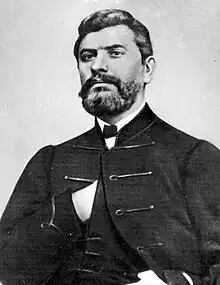Croatian state right
The Croatian state right (Croatian: Hrvatsko državno pravo) is a legal concept in Croatian law representing the entirety of written and customary rules on the establishment and functioning of public authorities in Croatia. It also refers to the legal status of Croatia as an independent polity or within the framework of various states Croatia was a part of through the history. Application of the doctrine of the Croatian state right in practice is pointed out as the evidence of continuous statehood of Croatia since the medieval Kingdom of Croatia. The Croatian state right as a source of sovereignty is listed in the preamble of the modern Constitution of Croatia.

The Croatian state right as this concept was first introduced in 1830 by Josip Kušević in the context of Croatian national revival. Kušević based the idea on development of town privileges and saw it as a means of defense against magyarisation. The term was popularised by Count Janko Drašković in his 1832 Dissertation and developed by Ante Starčević and Eugen Kvaternik. Starčević and Kvaternik argued that a given state creates the nation living in it, and consequently that all people living in Croatia are Croats and that other nations can only exist by exercising the right to nation-building in their own states. Implications of such definition of concept resulted in a conflict of Croatian and Serbian nationalisms.
Modern definition
The Croatian state right is a legal concept referring to the body of written and customary rules on the establishment and functioning of public authorities in Croatia. It also refers to the legal status of Croatia as a polity within the Kingdom of Hungary in the period after the Pacta conventa was drawn up in 1102 and the 1527 election in Cetin, as well as subsequently within the Habsburg Monarchy, the Austrian Empire and Austria-Hungary arising from the existence of the rules on the establishment and functioning of public authorities in Croatia. Application of the Croatian state right in practice is pointed out as the evidence of unbroken statehood of Croatia since the Middle Ages, extending from the medieval Kingdom of Croatia.[1]
Origin of the term
The concept of the Croatian state right was proposed and promoted in the 19th century in the process of Croatian national revival as a means of resistance against magyarisation. The origin of the 19-century application of the concept is found in the constitution based on town privileges proposed by Josip Kušević in 1830. The Croatian state right was also referenced by Count Janko Drašković in the 1832 Dissertation — a manifesto of the Illyrian movement.[1] The concept was elaborated by Ante Starčević, the founder of the Party of Rights. Starčević argued that states form nations creating a "citizens' state" where all citizens would be equal, discarding the ethnic and religious criteria in definition of a nation.[2] Starčević's ideas regarding the Croatian state right and implications on definition of the nation were further developed by Eugen Kvaternik. They described the state right as belonging to the Croat "political people" defined as medieval nobility and contemporary general public. Building on the Starčević's idea that the state can create the nation, the two claimed that there is no other people in Croatia other than Croats because existence of other nations can only come about through their right to another, separate political territory.[3] Such definition of the Croatian state right and its implications produced a conflict of the Croatian nationalism and the Serbian nationalism as the latter advocated popular sovereignty which would erase borders of previously existing polities with the aim of uniting all Serbs in a single state — including the Serbs of Croatia.[4]
Subsequent applications
In 1917, as Austria-Hungary was facing its dissolution, the representatives of South Slavs living in Austria-Hungary introduced the May Declaration to the Imperial Council, unsuccessfully proposing a reform of the monarchy. The declaration cited the concept of Croatian state right as its basis.[5] The Party of Rights lost popularity after the end of the World War I and creation of Yugoslavia, but the doctrine of the Croatian state right was accepted by Stjepan Radić's Croatian People's Peasant Party, which became the most influential political party among Croats in the interwar period following the 1920 elections.[4] During the World War II, the State Anti-Fascist Council for the National Liberation of Croatia (ZAVNOH) established by the Communist Party of Croatia (a component of the Communist Party of Yugoslavia) was founded as the supreme legislative body of Croatia under control of Yugoslav Partisans. In the immediate aftermath the war, the ZAVNOH renamed itself the "People's Sabor of Croatia" (Croatian: Narodni sabor Hrvatske). The name-change was designed to stress the historical continuity of Croatian legislative body as a representative of the state sovereignty of Croatia.[6] The modern Constitution of Croatia also references the Croatian state right in its preamble.[1]
See also
References
- "Hrvatsko državno pravo" [Croatian State Right]. Croatian Encyclopedia, on-line edition (in Croatian). Miroslav Krleža Institute of Lexicography. Retrieved 13 November 2022.
-
- Ramet, Sabrina P. (2006). The Three Yugoslavias: State-Building and Legitimation, 1918–2005. Bloomington: Indiana University Press. p. 39. ISBN 978-0-253-34656-8.
-
- Banac, Ivo (1984). The National Question in Yugoslavia: Origins, History, Politics. Ithaca, New York: Cornell University Press. pp. 85–88. ISBN 0-8014-1675-2.
- Vujačić, Veljko (2015). Nationalism, Myth, and the State in Russia and Serbia. Cambridge University Press. p. 202. ISBN 9781107074088.
- Pavlowitch, Kosta St. (2003). "The First World War and Unification of Yugoslavia". In Djokic, Dejan (ed.). Yugoslavism: Histories of a Failed Idea, 1918–1992. London: C. Hurst & Co. p. 32. ISBN 1-85065-663-0.
- Sirotković, Hodimir (1971). "Stvaranje federalne Hrvatske u narodnooslobodilačkoj borbi" [Creation of the Federal Croatia in the National Liberation Struggle]. Časopis za suvremenu povijest (in Croatian). Zagreb, Croatia: Croatian Institute of History. 3 (2–3): 35. ISSN 0590-9597.